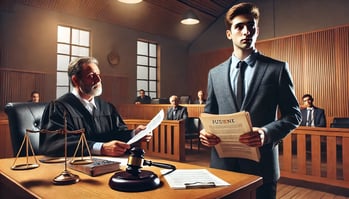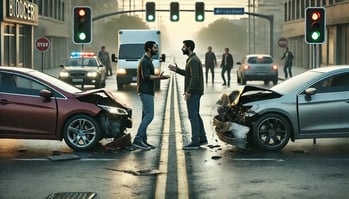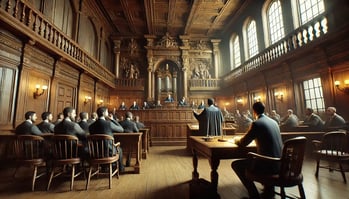Should You Apologize After A Car Accident?
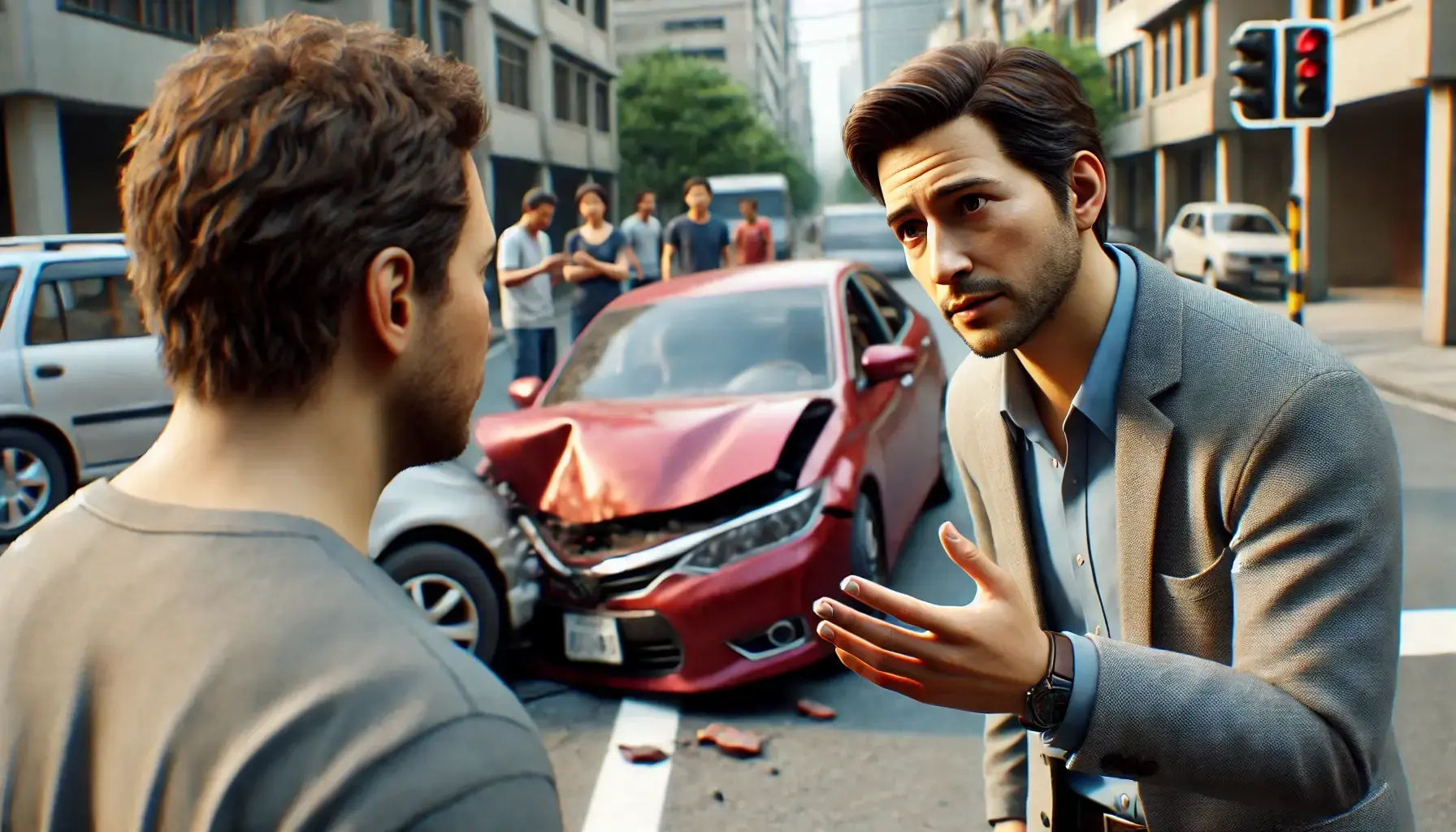
Legally reviewed by:
Daniel Smith October 15, 2024
If you are involved in a car accident, the anxiety, confusion, and generally high adrenaline you feel after can elicit many different reactions. Unfortunately, you may sometimes get caught up in the moment and take actions that might worsen an already bad situation.
Generally, one of the ways you can worsen your involvement in an already bad accident is by apologizing to the other party or parties. So, no, you should not apologize after a car accident.
But why is this so? And how does a simple, innocent apology that you intended to de-escalate the situation make things worse for you? We explore all of that in this article.
Why Apologizing is a Bad Idea
Apologies are rarely bad in any context. A simple "I'm sorry" is used to empathize and show care.
However, in tricky legal situations (like a traffic accident) where every action is potential evidence, an apology could take on a different meaning. How? The insurance and negligence laws that guide accidents emphasize fault in accidents. With traffic accidents, states adopt either the fault or no-fault practice.
Fault means that the individual responsible for the accident will be financially liable to anyone who has suffered injuries or property damage in that accident. A prominent state that operates with the fault principle is California, where Cal. Veh. Code § 1750 specifies that a vehicle owner will be responsible for any death, injury, or property damage caused by the vehicle's operation.
Other states adopting this practice include Georgia, Nevada, and Texas.
On the other hand, with no-fault states, the driver responsible for an accident is irrelevant if the accident causes injury. These states require all vehicle owners to have Personal Injury Protection (PIP) coverage with their insurer, who will provide compensation if they are in an accident.
New York is a well-known no-fault state, and N.Y. I.S.C. Law § 5103 provides that a vehicle owner will accordingly be entitled to first-party benefits.
Florida, Massachusetts, and North Dakota are other states with similar no-fault laws. However, it is essential to note that in no-fault states, the responsible driver could still be financially liable if the accident causes property damage, serious injury, or death.
Even so, auto accidents are not always clear-cut, and multiple parties may be responsible, hence the importance of negligence laws. Negligence laws are essential because, in most cases, a car accident will result from the failure of one driver to carry out the duty of care they owe other drivers. Again, states practice negligence laws differently, especially in relation to the amount of compensation a driver should be entitled to if that driver has also been negligent.
There are two main types of negligence laws: contributory and comparative negligence. In contributory negligence states, a driver will not be entitled to compensation if they bear any fault, even if it is just 1%. Virginia is one of the contributory negligence states. In Litchford v. Hancock, 232 Va. 496, 352 S.E.2d 335 (Va. 1987), the court affirmed that any negligence of a plaintiff that is a proximate cause of an accident would bar recovery. Other contributory negligence states are Alabama, Maryland, and North Carolina.
Meanwhile, comparative negligence states compare the parties' faults to determine if they can recover compensation, but they still practice this comparative negligence differently. In pure comparative negligence states like Arizona, Kentucky, and Mississippi, drivers will be allowed to recover compensation regardless of their level of fault in the accident, but they can only recover for the proportion of the accident they are not responsible for.
Miss. Code § 11-7-15, for instance, states that contributory negligence will not bar recovery, but damages will be diminished in proportion to the negligence attributable to the person injured.
Modified comparative negligence states, however, that the only barrier to a plaintiff's recovery is that the plaintiff is primarily responsible for the accident. Primary responsibility here means the plaintiff must have been 50% or more, or 51% or more, at fault, depending on the state.
Delaware is a modified comparative negligence state, and Del. Code tit. 10, § 8132 provides that as long as the plaintiff’s negligence is not greater than that of the defendant or the combined negligence of the defendants, the plaintiff will be entitled to compensation.
Summarily, the party at fault for an accident will be financially liable to the other party. And even if that party is not entirely or majorly responsible, their fault in the accident will almost always reduce the compensation they should be entitled to.
Is Apologizing Admitting Fault?
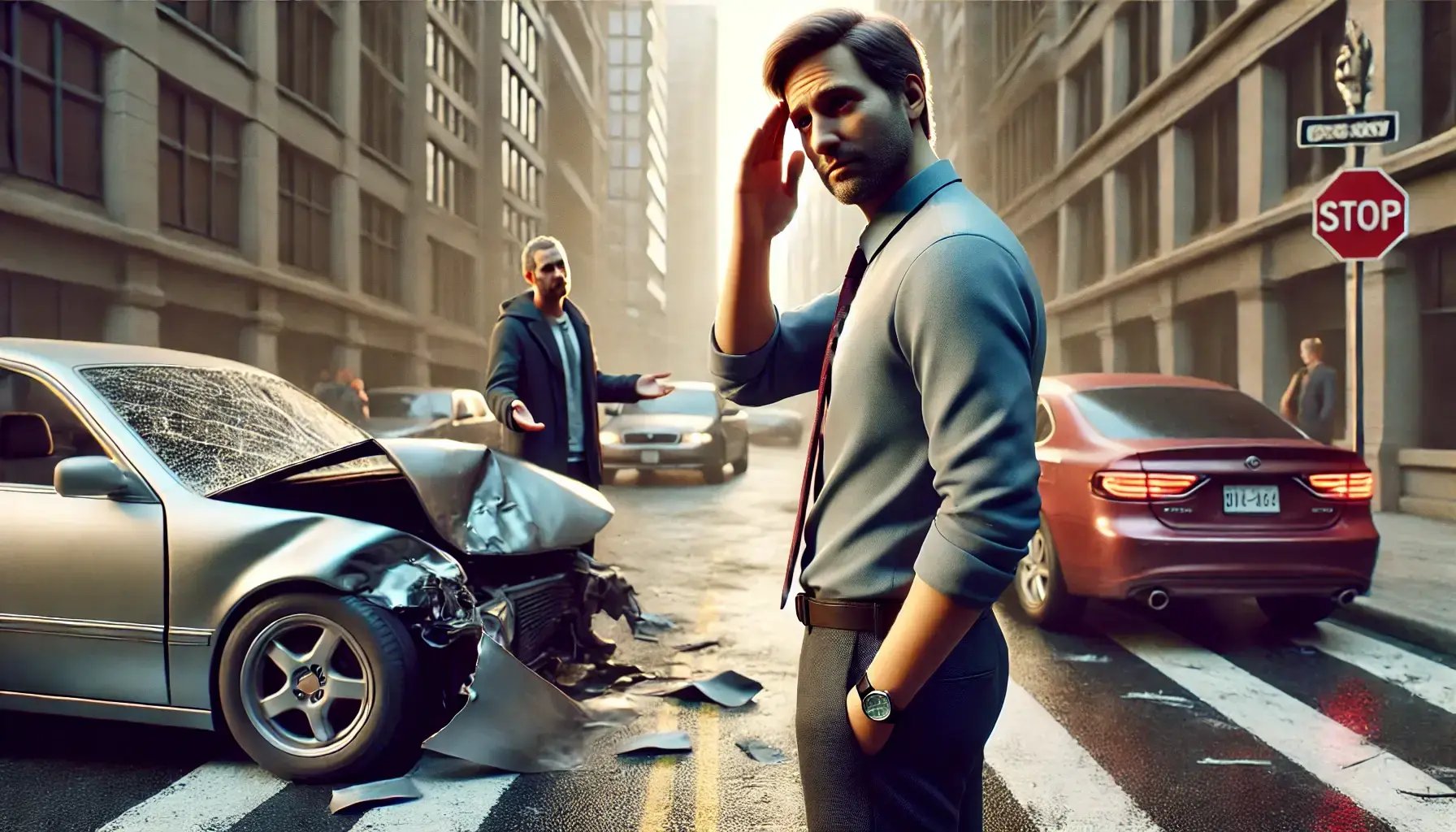
So, when you apologize after an accident, how does that connect to fault? And does an apology mean you have admitted to bearing some fault? Not always. In truth, courts will extensively consider the circumstances under which an apology is made to determine if that apology is an admission of fault.
Historically, juries and summary judgments have rarely found apologies in a personal injury case to be evidence of the defendant admitting fault. And Mass. Gen Laws ch. 233, § 23D specifies that benevolent gestures (actions that convey a sense of compassion from humane impulses) will be inadmissible as evidence of admission of liability, but only some states like California, Rhode Island, and Texas have similar laws.
Nevertheless, significant danger still lies in attempting to apologize. Plaintiffs often misconstrue apologies to present them as admissions of fault, and since traffic accident cases rarely go to trial, many insurance companies also interpret apologies to devalue a settlement.
Furthermore, it is incredibly easy to admit fault while trying to apologize. While a simple "I'm sorry" may not be considered an admission of fault in court, "I'm sorry, I didn't see you" or "I'm sorry, I was distracted by x and y” could be admissions of fault.
Legal & Insurance Implications
Apologizing after an accident may have significant implications legally and for your insurance settlement. These implications include:
Police reports
Official police reports are often relied on in courts and by insurance companies to understand what happened before and after the accident fully. Most of the time, these reports record an apology while describing events. Therefore, such apologies could be intentionally or unintentionally misconstrued.
Fault
We've established the importance of determining the at-fault driver in accidents and how fault reduces the settlement you'll be entitled to after an accident. If a police report is relied on to establish fault, and that report indicates an apology from one party to another, it could be taken to mean the apologizing party was aware and feels responsible for the accident.
Devalued settlement
An insurance company could rely on the apology to insist that your settlement must be devalued because you shared fault in the accident. This is one of the most common tactics insurers use to avoid paying what they should.
Case Evidence
Usher v. Jones, 943 F.2d 889 (8th Cir. 1991) is one of multiple cases that have established that courts may admit apologies into evidence for a case. And such apologies, once admitted, can be presented as an admission of fault even though you did not mean it that way. However, with a skilled lawyer, you will likely be able to
What You Should Do Instead
Remain calm. Instead of apologizing after an accident, you can ask if the other driver is okay or if anyone is hurt. Do not say anything that may be interpreted as you taking the blame.
If anyone has been injured or there has been significant property damage, immediately call the police and wait on the scene till they arrive. While investigating the accident, the police will interview you. During this interview, focus on describing your perspective of the accident and refrain from admitting to things you are unsure about.
If no one has been injured in the accident and there is no significant property damage, focus on exchanging important information with the other driver. Important information will include names, addresses, vehicle registration numbers, and insurance information like insurer name, insurer address, and policy numbers.
If the other driver apologizes to you, thank them for their apology. Do not empathetically return the apology or try to make them feel better by admitting you also made some mistakes. To do this, you can say things like “Don’t worry, it happens” instead of “It’s not all your fault. I also…”
Finally, ensure you seek legal counsel as soon as possible. Once you have a lawyer, you can give them details of your accident and tell them if you believe you were at fault in any way. Your lawyer will then focus on getting you the best possible compensation.
How The Accident Helpers Can Help You
At The Accident Helpers, we maintain a network of skilled car accident lawyers nationwide. Whether you've apologized after a car accident or believe you might have contributed to the accident in a way and didn't apologize, our lawyers can still help you get compensated.
Schedule a session with us, and one of your consultants will gather the facts of your accident. Then, we will immediately connect you with the most trusted lawyers in your city. The best part is that our services are completely free. So reach out to us today, and let us ensure you get compensated appropriately.


